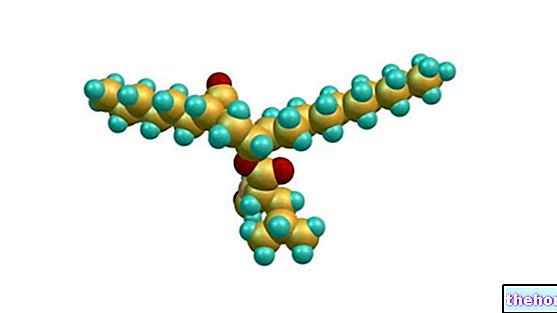ALIMIX ® is a drug based on cisapride monohydrate.
THERAPEUTIC GROUP: spasmolytics, prokinetics.

Indications ALIMIX ® Cisapride monohydrate
ALIMIX ® is indicated in the treatment of dyspeptic disorders in the absence of organic lesions of the digestive tract, in gastroesophageal reflux and in the symptomatic treatment of gastroparesis of various origins.
Mechanism of action ALIMIX ® Cisapride monohydrate
ALIMIX ® through its active ingredient cisapride, is able to enhance the normal release of acetylcholine at the level of the myenteric plexus, and to stimulate the contraction of smooth muscles. More precisely, its molecular action translates - at a functional level - into an increase:
- of the peristaltic esophageal activity and the tone of the lower esophageal sphincter, with consequent prevention of gastroesophageal reflux
- of stomach contractility, with consequent improvement of gastric emptying and anthro-duodenal coordination
- of intestinal propulsive activity, with a more rapid intestinal transit.
The cisapride contained in ALIMIX ® is rapidly and totally absorbed following oral administration, reaching maximum plasma peaks around 120 minutes from ingestion. After carrying out its biological action, cisapride is metabolized and subsequently excreted in equal parts through urine and feces.
Studies carried out and clinical efficacy
1. CISAPRIS INEFFECTIVE IN THE TREATMENT OF REFLUX GASTROESOPHAGUS OF INFANTS
Cochrane Database Syst Rev. 2010 Apr 14; 4: CD002300.
Cisapride treatment for gastro-oesophageal reflux in children. Maclennan S, Augood C, Cash-Gibson L, Logan S, Gilbert RE.
This study focuses on the real efficacy of cisapride in the treatment of gastroesophageal reflux in newborns. In particular, from the studies carried out with more than 260 recruited subjects, no statistically significant evidence emerges on the efficacy of this active ingredient in the attenuation of symptomatology, emphasizing instead the presence of important side effects, such as diarrhea and arrhythmias In the light of these data, the authors suggest the need for close specialist supervision during the treatment period.
2. CISAPRIDE AND GASTRO-ESOPHAGEAL REFLUX
Clin Drug Investig. 1998; 16: 9-18.
Meta-Analyzes of Cisapride, Omeprazole and Ranitidine in the Treatment of GORD: Implications for Treating Patient Subgroups. .
Iskedjian M, Einarson TR.
This meta-analysis study - which evaluated more than ten years of literature - shows how cisapride is second only to omeprazole in the pharmacological treatment of gastroesophageal reflux disease. Despite the efficacy of cisapride in reducing symptoms, the percentage of relapse (33%) is decidedly higher than that observed for omeprazole (17%), which today remains the treatment of first choice.
3. CISAPRIDE And dyspepsia
J Gastroenterol Hepatol. 2007 Mar; 22: 304-10.
Meta-analysis of the effects of prokinetic agents in patients with functional dyspepsia.
Hiyama T, Yoshihara M, Matsuo K, Kusunoki H, Kamada T, Ito M, Tanaka S, Nishi N, Chayama K, Haruma K.
An extremely important meta-analysis study, which recovers more than 50 years of studies for a total of 1844 patients with functional dyspepsia, shows how the use of prokinetics for the treatment of functional dyspepsia can guarantee a significant improvement in the state of health, despite the fact that it is of a chronic condition.
Method of use and dosage
ALIMIX ® 10 mg tablets: we recommend taking one tablet three times a day, preferably 15 minutes before meals
ALIMIX ® oral suspension 10mg / 3g: in children under 25 kg the dosage of 0.2mg / kg should never be exceeded 3-4 times a day
The daily dose should be halved in case of hepatic and renal insufficiency.
Warnings ALIMIX ® Cisapride monohydrate
The use of ALIMIX ® is not recommended in case of organic damage to the digestive tract, for which the increase in motility could result in a worsening of the symptoms.
Furthermore, for patients with potential risk factors for cardiac arrhythmias, renal insufficiency, respiratory insufficiency and alterations in the normal electrolyte balance, a control electrocardiogram and an evaluation of the serum levels of some minerals and of the renal function would be indicated, before proceeding with the administration. of ALIMIX ®
Although there are not yet sufficient experimental data, it is not recommended to take ALIMIX ® in patients with pheochromocytoma (a rare form of tumor characterized by an "increased secretion of catecholamines) due to the possible onset of hypertensive crisis.
Alone, ALIMIX ® does not affect attention and perception skills and does not induce drowsiness; however, if taken concomitantly with barbiturates or alcohol, it could accelerate the absorption times and interfere with the normal functioning of the nervous system.
PREGNANCY AND BREASTFEEDING
Experimental studies conducted on animals and clinical studies conducted on humans have not shown any embryotoxic or teratogenic effects of ALIMIX ® However, it should be avoided during the first trimester of pregnancy.
Studies on the pharmacokinetics of the drug have shown the presence of a small amount of Cisapride in breast milk; therefore it is advisable to stop breastfeeding during the treatment plan with ALIMIX ®
Interactions ALIMIX ® Cisapride monohydrate
Given the prokinetic capacity of ALIMIX ®, the normal absorption profile of various drugs could be altered; more precisely, gastric absorption could be reduced (following increased motility) and intestinal absorption accelerated. Consequentially. ALIMIX ® can interact with:
- Benzodiazepines, alcohol and anxiolytics, accelerating their effects;
- Azole antifungals, macrolide antibiotics (erythromycin, clarithromycin and troleandomycin), HIV protease inhibitors and nefazodone, can inhibit the CYP3A4 enzyme, responsible for the metabolism of cisapride, inducing an increase in plasma levels of the drug with consequent increased risk of cardiac arrhythmias Tachycardia.
- Antiarrhythmics, tricyclic antidepressants, tetracyclic antidepressants, antipsychotics, antihistamines, bepidril, halofantrine and sparfloxacine, which - by lengthening the QT interval - can put the patient at risk for cardiovascular events.
- Grapefruit juice and cimetidine, which increase its bioavailability.
Contraindications ALIMIX ® Cisapride monohydrate
ALIMIX ® is contraindicated in case of hypersensitivity to the active substance or to one of its components, in patients with QT interval lengthening or undergoing therapy with drugs capable of lengthening this interval, in conditions of hypokalaemia or hypomagnesemia, in premature infants for the first three months of life, in patients with hepatic and renal insufficiency, for whom it is possible to halve the dose only under strict medical supervision.
ALIMIX ® contains aspartame; therefore against indicated in patients with phenylketonuria.
Undesirable effects ALIMIX ® Cisapride monohydrate
Given the biological effect of ALIMIX ® it is possible to find with a certain frequency:
- diarrhea
- abdominal cramps
- borborigmi.
Less frequent are episodes of hypersensitivity to cisapride or to one of its metabolites, characterized by skin rash, itching, hives, headache and bronchospasms.
Reports made about side effects on the CNS, such as compulsive manifestations, changes in the haematological picture have not been directly related to the intake of ALIMIX ®
On the other hand, it was possible to detect tachycardia and arrhythmias events in patients undergoing drug therapy with inhibitors of the CYP3A4 enzyme system or suffering from heart disease or risk factors for pre-existing arrhythmias.
Excessive doses of ALIMIX ® can cause lengthening of the QT interval, diarrhea and abdominal cramps, while in children it can produce sedative effects, apathy and atony.
Note
Notes: the drug ALIMIX ® Cisapride monohydrate can only be purchased upon presentation of a medical prescription.
The information on ALIMIX ® Cisapride monohydrate published on this page may be out of date or incomplete. For a correct use of this information, see the Disclaimer and useful information page.























-nelle-carni-di-maiale.jpg)




